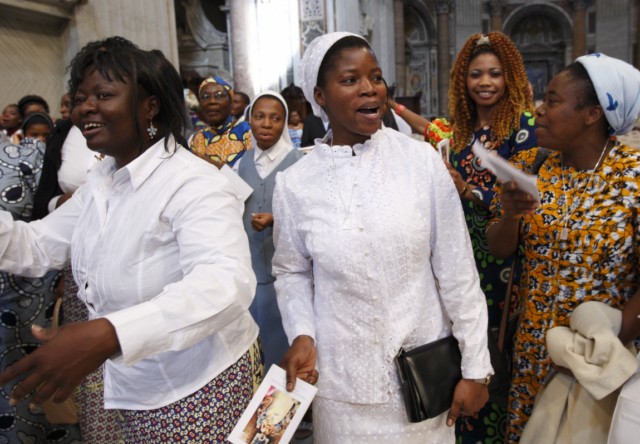African Synod Begins

Cardinal Peter Kodwo Appiah Turkson of Ghana has said there’s no reason why a future pope can’t be black, just as the United Nations has had a black secretary general and the United States now has a black president.
Responding to a question at a Vatican press conference today about whether the Church is ready for a black pope, Cardinal Turkson replied: “Why not?” He added the Church has historically been “very successful” in electing “everyone” as popes.
The archbishop of Cape Coast referred to modern-day precedents in high-profile international positions, such as his countryman Kofi Annan who served as U.N. secretary general from 1997 through 2006, and now Barack Obama as president of the United States. “If God would wish to see a black man as a pope, thanks be to God,” Cardinal Turkson said.
Cardinal Turkson, who is himself tipped by some as papabile (a possible candidate for the papacy), stressed that every priest when he is ordained should accept the potential that he may become a bishop, cardinal or even pope.
When also asked what he thought of the United States having its first African-American president, the cardinal said it wasn’t surprising, given the values and tenets of the country that stresses that all men are born equal with equal rights.
Cardinal Turkson was speaking on the first working day of the first General Congregation of the Second Special Assembly for Africa of the Synod of Bishops. He is the general relator of the meeting which ends Oct. 25 — the person responsible for formulating the propositions of the bishops.
A Spiritual ‘Lung’
Pope Benedict XVI opened the synod yesterday with a Mass in St. Peter’s Basilica. He said Africa represents an “enormous spiritual ‘lung’ for a humanity that appears to be in a crisis of faith and hope.”
But the Pope pointed out that the lung can be afflicted with illness, and he explained forthrightly how the African continent is currently threatened by two dangerous pathologies. The first, he said, is “practical materialism, combined with relativist and nihilist thinking” that, he added, is already widespread in the West.
The Holy Father said there was “absolutely no doubt that the so-called First World has exported and continues to export its spiritual toxic waste that contaminates the peoples of other continents, in particular those of Africa.” In this sense, he added, “Colonialism, which is over at a political level, has never really entirely come to an end.”
The second “virus” that could hit Africa, Benedict said, was religious fundamentalism, mixed with political and economic interests. He referred to how certain religious groups are spreading through Africa in God’s name, but which follow “a logic that is opposed to divine logic, that is, teaching and practicing not love and respect for freedom, but intolerance and violence.”
At this morning’s opening session, the Pope broke with precedent to offer some further reflections of his own, stressing the importance of seeing Africa’s problems — particularly reconciliation, justice and peace — in the light of God.
“Our analyses are deficient,” the Holy Father warned, “if we do not realize that behind the injustice of corruption, and all such things, is an unjust heart, a closure towards God and thus a falsification of the fundamental relationship upon which all other relationships are founded.”
Vocations and Conversions
In his “Relatio ante disceptationem” (a report before the discussion) delivered this morning, Cardinal Turkson drew attention to the “exceptional growth” of the Church in Africa, but also discussed problems facing the continent. In particular, he highlighted the “fidelity and commitment of religious to their vocations” and the need for a “deep and permanent conversion.”
The first issue, he told journalists, drew attention to the struggles some priests and religious have with celibacy, while the second aimed to shed light on another problem in Africa: the need for a deep and lasting conversion rather than notional Christianity.
“Conversion is the starting point of Christian living,” Cardinal Turkson said. “When we don’t have an experience of conversion, we are people who know something about Christianity and try to live it, but without a commitment that comes from an interior conviction.”
The scourge of HIV/AIDS is also likely to be discussed during the large three-week gathering, which brings together 239 bishops from all over the world. In his press conference this morning, Cardinal Turkson reiterated the Church’s teaching of abstinence and fidelity as opposed to use of condoms in the prevention of the spread of the disease.
He underlined one practical reason why condoms are ineffective. “Let’s speak plainly,” Cardinal Turkson said. “We’re talking about a factory product where there are different qualities. There are condoms which arrive in Ghana which burst during sex and so they give the person a false sense of security, and which rather facilitate the spread of HIV/AIDS.”
As well as advocating abstinence and fidelity, the cardinal also proposed diverting resources from the promotion and production of condoms to subsidizing anti-retroviral drugs that are largely unavailable in Africa because of their cost. Anti-retrovirals are used to boost the immune system of HIV sufferers and to suppress the virus in the blood.
Said Cardinal Turkson, “Africa would be happier if the resources were directed there.”














